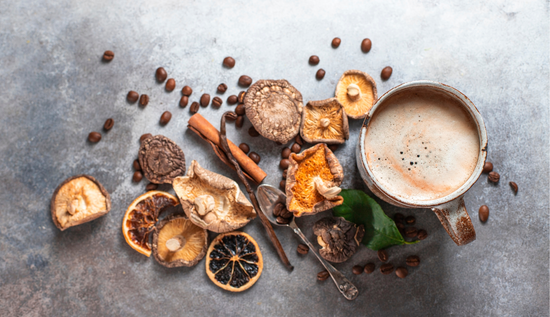
Starting the day with a cup of coffee is a ritual–one that’s backed by a hearty dose of caffeine to get you going. Coffee also has other health benefits, like regulating digestion and improving circulation. However, it’s not the only morning beverage that can be served up hot (or cold) to carry you through your day–Matcha is also an option, and a good one at that.
Matcha tea, a hearty form of green tea known for giving a serious antioxidant boost, is a great option for your morning wake up routine. But how does it stack up against the world's most popular morning cup? More specifically, what are the differences in matcha caffeine vs coffee caffeine content?
We will explore the differences between matcha and coffee, including their caffeine content, health benefits, and overall effects on the body.
Table of Contents
Key Takeaways
Matcha has less caffeine than coffee but can still over a stimulating boost.
Both coffee and matcha have some other health benefits, like anti-inflammatory effects and antioxidant effects.
Too much caffeine, like when consuming large amounts of coffee, is associated with jitteriness and anxiety.
What is Matcha?
To understand the differences between matcha and coffee, it's important to first understand what matcha is. Matcha is a powdered form of green tea that originated in Japan. It is made from shade-grown tea leaves that are finely ground into a vibrant green powder.
Unlike traditional green tea, where the leaves are steeped and discarded, matcha is consumed in its entirety, making it a concentrated source of nutrients and antioxidants. It also provides a rich flavor that’s earthy and fragrant, making it more wholesome and hearty than a cup of strained green tea. Many people add cream, sweetener, and other flavor profiles to their matcha, and matcha lattes are a great contender for a bold, morning wake up cup.
Caffeine Content: Matcha vs. Coffee
When it comes to caffeine content, matcha and coffee have distinct differences. Coffee is known for its high caffeine content, providing a strong and immediate energy boost. On the other hand, matcha contains a more moderate amount of caffeine.
While the exact caffeine content can vary depending on factors such as the quality of the tea leaves and brewing methods, a typical cup of matcha contains approximately 30-50 milligrams of caffeine. In comparison, an average cup of coffee contains around 60-95 milligrams of caffeine. This makes matcha a milder option for those seeking a more balanced and sustained energy boost.
Caffeine Effects on the Body
The effects of caffeine on the body can vary from person to person, and it's essential to consider individual sensitivities and tolerances. Coffee's higher caffeine content often leads to a quick and intense energy spike, providing a jolt of alertness and focus. However, this can be followed by a crash or feelings of jitteriness as the caffeine wears off.
Matcha, on the other hand, offers a more gradual release of caffeine due to its unique composition. Matcha contains an amino acid called L-theanine, which has a calming effect on the body. This amino acid helps to balance the stimulating effects of caffeine, promoting a state of alert relaxation. As a result, matcha can provide a sustained energy boost without the crash commonly associated with coffee.
The combination of L-Theanine and caffeine may have nootropic benefits that help to improve focus and memory, too. Matcha, in general, is thought to be a nootropic food, so it may have additional brain-boosting benefits.
Coffee vs Matcha: Antioxidant and Nutritional Profile
One of the notable advantages of matcha over coffee is its antioxidant and nutritional profile. Matcha is rich in catechins, a type of antioxidant that has been associated with various health benefits, including reducing the risk of chronic diseases. In fact, matcha contains significantly higher levels of catechins compared to regular brewed green tea due to its concentrated form.
Additionally, matcha is a good source of vitamins and minerals, including vitamin C, vitamin A, potassium, and iron. These nutrients contribute to overall well-being and support various bodily functions. Coffee, although it contains some antioxidants, does not provide the same level of nutritional benefits as matcha.
Coffee is, however, associated with a few unique benefits, like liver-protective and digestion-supporting effects that may make you less likely to develop colorectal cancer.
Matcha vs Coffee: Which is Best?
When deciding between matcha and coffee, it ultimately comes down to personal preference and individual needs. If you enjoy the robust flavor, immediate energy boost, and are less sensitive to caffeine, coffee may be the beverage of choice. On the other hand, if you prefer a milder and more sustained energy release, along with the potential health benefits and mindful qualities, matcha could be the perfect alternative.
Luckily, at Lucid, we won’t make you choose. If you want to enjoy the brain-and-body balancing benefits of our mushroom+nootropic blend, you can choose from Coffee, Matcha, or Chai Tea. Each offers a mild caffeine dose backed with unique medicinal mushrooms and nootropics that give you the total-body boost you need with none of the jitters or crash. Want to know more? Read “Why We Chose Our Ingredients: What’s in a Lucid Stack?”


